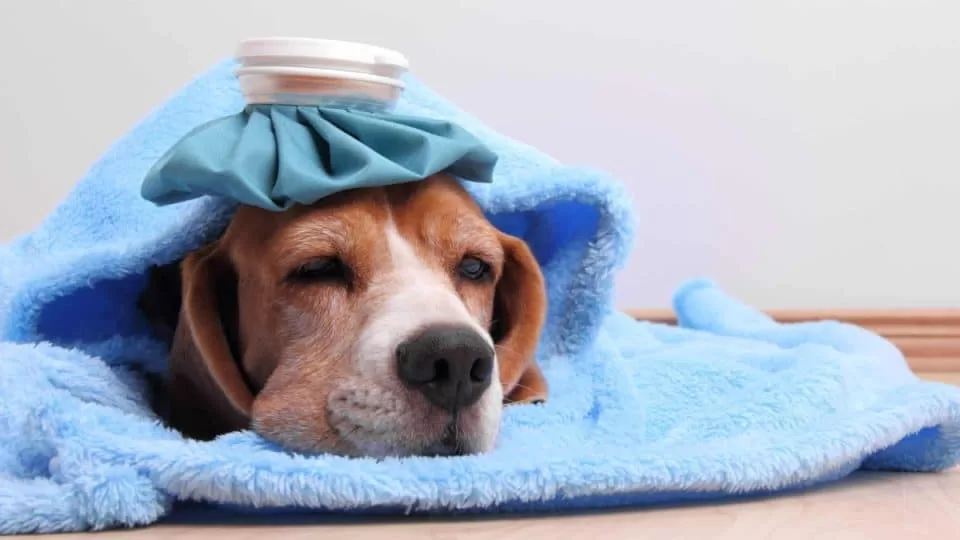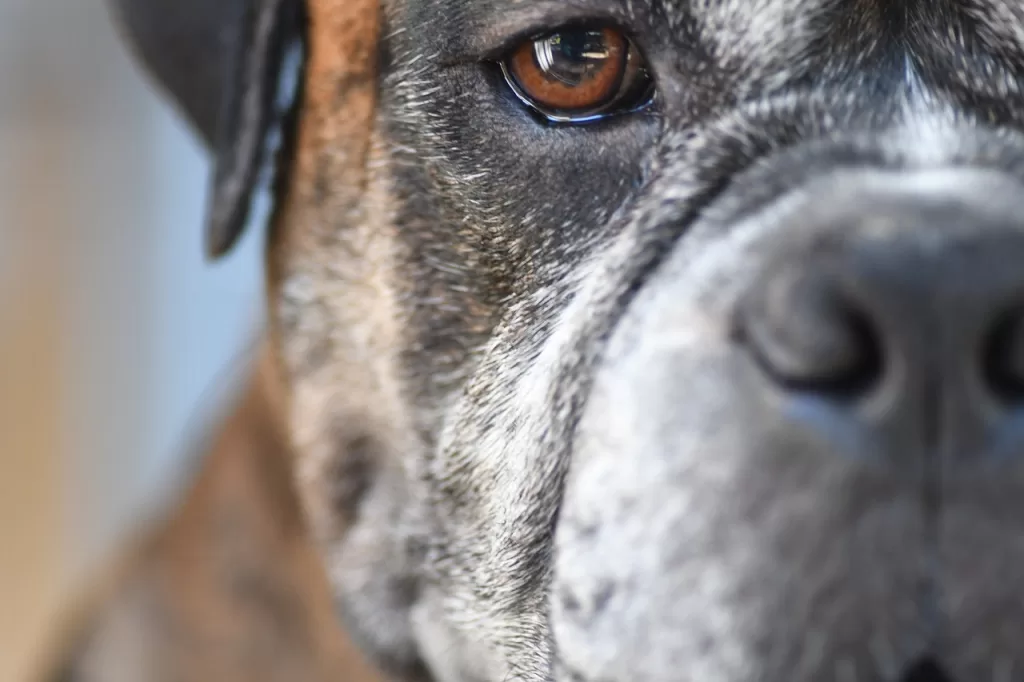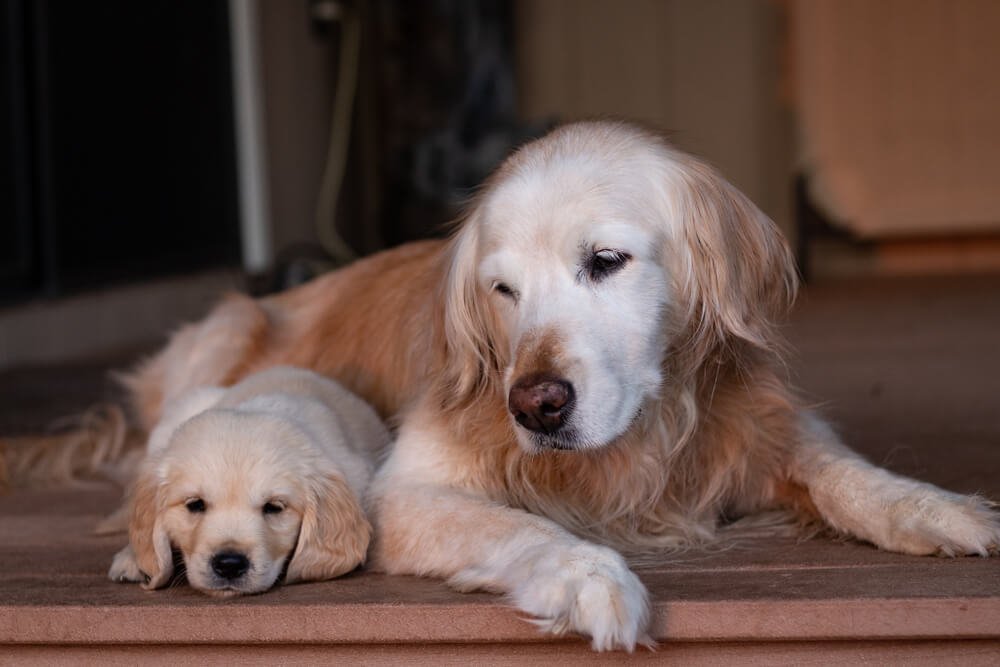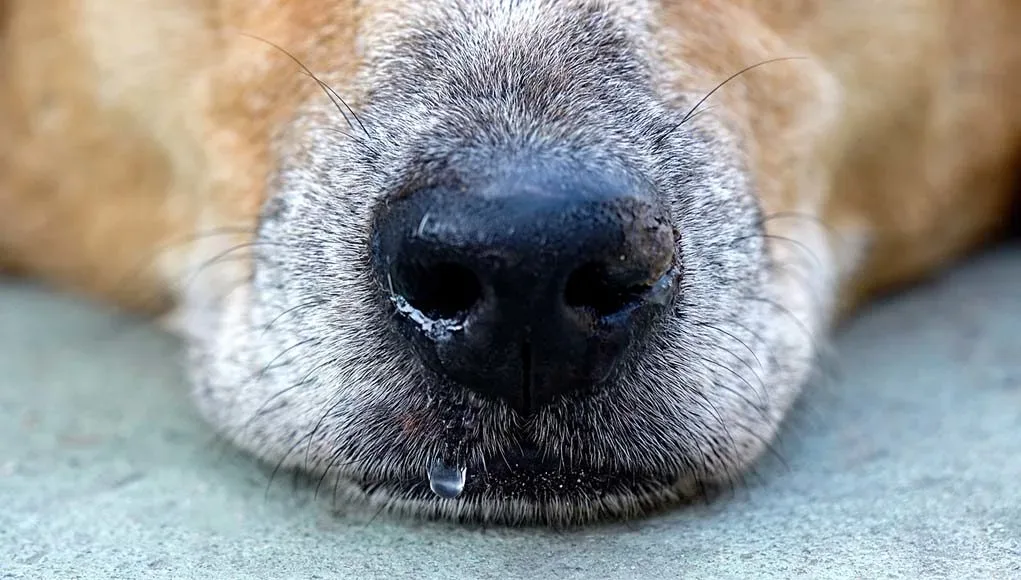A runny nose in dogs is a common occurrence that can happen for a variety of reasons. Dogs have a highly sensitive sense of smell, and a runny nose can affect their ability to pick up scents. Therefore, it is important to identify and treat the underlying cause of the runny nose to ensure your furry friend stays healthy.
Table of Contents
One of the most common causes of a runny nose in dogs is allergies. Dogs can be allergic to a variety of environmental triggers, including pollen, dust, and mold. Allergies can cause a runny nose, sneezing, and other symptoms that can be uncomfortable for your dog. In some cases, allergies can lead to more serious conditions like respiratory infections or pneumonia if left untreated.
Other possible causes of a dog’s runny nose include infections, foreign bodies in the nose, and dental problems. Infections can be viral or bacterial and may require medication to treat. Foreign bodies, such as grass or seeds, can become lodged in the nose and cause irritation and discharge. Dental problems, such as abscesses, can also lead to a runny nose in dogs. If you notice your dog has a persistent runny nose or other symptoms, it is best to consult with a veterinarian to determine the underlying cause and appropriate treatment.
Causes of Runny Nose in Dogs
Runny nose in dogs is a common occurrence, and there are several reasons why it can happen. It is essential to identify the underlying cause of the runny nose to determine the appropriate treatment. Here are some of the common causes of runny nose in dogs:
Common Cold and Infections
Dogs can catch colds just like humans, and it can cause a runny nose. Viral infections, such as canine distemper, kennel cough, and canine influenza, can also cause a runny nose. Bacterial infections, such as pneumonia and sinusitis, can also lead to nasal discharge. Dogs with weakened immune systems are more susceptible to infections.
Allergies and Environmental Factors
Allergies to pollen, dust, mold, and other environmental factors can cause a runny nose in dogs. Dogs can also be allergic to certain foods, which can cause nasal discharge. Environmental irritants, such as cigarette smoke, can also cause a runny nose in dogs.
Structural Abnormalities and Foreign Bodies
Structural abnormalities in the nasal cavity, such as a deviated septum, can lead to a runny nose in dogs. Foreign bodies, such as grass awns or foxtails, can also get stuck in the nasal cavity and cause irritation and discharge. Tumors in the nasal cavity can also cause a runny nose.
It is important to note that a runny nose in dogs can be a symptom of a more severe underlying condition. If the dog has a persistent runny nose, it is best to consult a veterinarian for proper diagnosis and treatment.
In summary, runny nose in dogs can be caused by various factors, including infections, allergies, environmental factors, structural abnormalities, and foreign bodies. Identifying the underlying cause is crucial in determining the appropriate treatment.
Symptoms to Observe

Dogs may experience a runny nose due to various reasons, including allergies, infections, irritants, or foreign bodies. It is important to observe the symptoms of a runny nose in dogs to determine the underlying cause and provide appropriate care.
Discharge Types and What They Indicate
A dog’s runny nose can have different types of discharge, depending on the cause and severity of the condition. The color, consistency, and amount of discharge can provide clues to the underlying problem and help the veterinarian diagnose and treat your dog. Here are some common types of discharge and what they indicate:
- Clear and watery discharge. This is usually a sign of a mild irritation or allergy, such as pollen, dust, or cold weather. It can also be caused by excitement, anxiety, or exercise. This type of discharge is usually not a cause for concern, unless it is excessive, persistent, or accompanied by other symptoms, such as sneezing, coughing, or itching. In that case, your dog may have a more serious allergy or infection that needs treatment.
- Yellow or green discharge. This is usually a sign of a bacterial infection, such as kennel cough, canine influenza, or sinusitis. It can also be caused by a fungal infection, such as aspergillosis, or a foreign body in the nose, such as a grass seed or a tumor. This type of discharge is often thick, sticky, and foul-smelling, and it may be accompanied by fever, loss of appetite, or difficulty breathing. Your dog will need antibiotics or antifungals to treat the infection, and may also need surgery to remove the foreign body or tumor.
- Bloody or brown discharge. This is usually a sign of a serious condition, such as a bleeding disorder, a nasal tumor, a fungal infection, or a tick-borne disease. It can also be caused by trauma, such as a bite wound, a nosebleed, or a foreign body in the nose. This type of discharge is often accompanied by pain, swelling, or difficulty breathing, and it may indicate a life-threatening situation. Your dog will need immediate veterinary attention to stop the bleeding, diagnose the cause, and provide appropriate treatment.
A dog’s runny nose can have different types of discharge, depending on the cause and severity of the condition. The color, consistency, and amount of discharge can provide clues to the underlying problem and help the veterinarian diagnose and treat your dog. If your dog has a runny nose, you should monitor their symptoms and see if they improve or worsen. If your dog has a colored, bloody, or smelly discharge, or if they have other signs of illness, you should take them to a vet as soon as possible.
Associated Signs of Illness
In addition to a runny nose, dogs may exhibit other signs of illness. Here are some associated signs of illness to look out for:
- Coughing: A runny nose accompanied by coughing may indicate an upper respiratory infection or kennel cough.
- Sneezing: Sneezing may occur due to allergies or irritants, but it may also indicate an infection or foreign body in the nasal passages.
- Lethargy: Dogs with a runny nose may feel tired or lethargic due to the body’s response to the underlying cause of the runny nose.
Observing the symptoms of a runny nose in dogs can help determine the underlying cause and provide appropriate care. If a dog has persistent or severe symptoms, it is important to consult a veterinarian for proper diagnosis and treatment.
Diagnosis and Veterinary Care

Physical Examination and History
When a dog is brought in with a runny nose, the veterinarian will begin by taking a thorough history and performing a physical examination. The vet will ask the owner about the duration and nature of the nasal discharge, whether it is coming from one or both nostrils, and whether the dog has any other symptoms such as coughing, sneezing, or fever. The vet will also perform a complete physical examination, including a check of the dog’s ears, eyes, throat, and lymph nodes.
Also Read: How to feed blue buffalo small breed healthy weight Dog good for my Shih Tzu?
Diagnostic Tests
Diagnostic tests may be necessary to determine the underlying cause of the runny nose. These may include blood tests, x-rays, and cultures of the nasal discharge. In some cases, a biopsy of the nasal tissue may be necessary. The vet may also use a scope to examine the nasal passages and throat.
If the runny nose is caused by an infection, the vet may prescribe antibiotics or other medications. If the underlying cause is allergies, the vet may recommend allergy testing and treatment. In some cases, surgery may be necessary to remove a foreign object or to correct a structural abnormality in the nasal passages.
It is important to seek veterinary care promptly if a dog has a runny nose. In some cases, a runny nose can be a sign of a serious underlying condition, such as cancer or a fungal infection. Early diagnosis and treatment can improve the dog’s prognosis and quality of life.
Treatment Options
When it comes to treating a runny nose in dogs, there are several options available. Depending on the cause and severity of the condition, different treatments may be more effective than others. In this section, we’ll explore some of the most common treatment options for dogs with runny noses.
Medications and Therapies
In cases where a dog’s runny nose is caused by an infection, antibiotics may be prescribed to help clear up the infection. Antihistamines may also be used to help reduce inflammation and alleviate symptoms associated with allergies. It is important to note that not all medications are safe for dogs, and it is always best to consult with a veterinarian before administering any medication to your pet.
In more severe cases, surgery may be required to correct underlying issues that are causing a dog’s runny nose. For example, if a dog has a nasal tumor or foreign object lodged in their nasal cavity, surgery may be necessary to remove the obstruction.
Home Remedies and Care
There are several home remedies and care options that can help alleviate a dog’s runny nose. One of the most effective ways to help reduce inflammation and congestion is by using a humidifier or vaporizer. These devices help to moisten the air and make it easier for dogs to breathe.
Another home remedy is to use a saline nasal spray or rinse to help flush out any mucus or debris in a dog’s nasal passages. This can be done using a bulb syringe or a specialized nasal rinse kit.
It is also important to keep a dog well-hydrated and to provide them with plenty of rest. Encouraging a dog to eat nutrient-rich foods can also help support their immune system and aid in the healing process.
Overall, there are several treatment options available for dogs with runny noses. Whether it be through medication, surgery, or home remedies, it is important to work closely with a veterinarian to determine the best course of action for your pet.
Prevention and Management
Environmental Management
Environmental factors can play a significant role in causing a runny nose in dogs. Therefore, it is essential to manage the environment to prevent the onset of this condition.
One of the most effective ways to prevent a runny nose in dogs is to keep the environment clean. Regularly cleaning the house, especially floors, carpets, and furniture, can help reduce the number of allergens and irritants that can cause a runny nose. Using air purifiers and humidifiers can also help improve the air quality in the house and reduce the risk of respiratory problems.
Dogs that are prone to allergies should be kept away from the allergens that trigger their allergies. For instance, if a dog is allergic to pollen, it is best to keep them inside during peak pollen seasons. Similarly, if a dog is allergic to dust mites, it is best to use dust mite covers on their bedding and wash their bedding regularly.
Diet and Nutrition
Diet and nutrition can also play a role in preventing a runny nose in dogs. A well-balanced diet that includes all the necessary nutrients can help boost the immune system and reduce the risk of respiratory infections.
It is also essential to keep the dog hydrated. Drinking enough water can help flush out toxins from the body and prevent dehydration, which can cause dry nasal passages and lead to a runny nose.
In addition to a balanced diet, several supplements can help boost the immune system and reduce the risk of respiratory infections. For example, Vitamin C and Echinacea have been shown to have immune-boosting properties and can help prevent respiratory infections in dogs.
Overall, preventing a runny nose in dogs involves managing their environment and providing them with a well-balanced diet and proper nutrition. By taking these steps, pet owners can help keep their furry friends healthy and happy.
When to See a Vet
A runny nose in dogs can be caused by a variety of factors, including allergies, infections, and foreign objects. In most cases, a runny nose is not a cause for concern and will clear up on its own. However, in some cases, a runny nose can be a sign of a more serious condition that requires veterinary attention.
Emergency Situations
If a dog has a snotty nose or their nose is running clear, it may not be an emergency situation. However, if a dog has a runny nose and is also experiencing other symptoms such as difficulty breathing, coughing, or lethargy, it may be a sign of a more serious condition. In these cases, it is important to seek veterinary care immediately.
Monitoring and Follow-Up
If a dog’s nose is running clear and they are otherwise healthy, it may not be necessary to seek veterinary care. However, if the runny nose persists for more than a few days or is accompanied by other symptoms such as sneezing or coughing, it is important to schedule an appointment with a veterinarian.
During the veterinary visit, the vet may perform a physical examination and may also recommend diagnostic tests such as blood work or imaging to determine the underlying cause of the runny nose. Treatment options may include medications such as antibiotics or antihistamines, or in some cases, surgery may be necessary.
In summary, if a dog has a runny nose and is experiencing other symptoms such as difficulty breathing or coughing, it is important to seek veterinary care immediately. If the runny nose persists for more than a few days or is accompanied by other symptoms, it is also important to schedule a veterinary visit to determine the underlying cause and appropriate treatment.
Special Considerations for Puppies and Senior Dogs

A runny nose in dogs can have different causes and implications depending on the age of the dog. Senior dogs and puppies are more vulnerable to certain conditions that can affect their nasal health and well-being. Here are some age-specific considerations for senior dogs and puppies with respect to runny nose in dogs:
Senior dogs
- One of the reasons why senior dogs may have a runny nose is due to age-related changes in their respiratory system. As dogs age, their immune system weakens, making them more prone to infections and illnesses that can cause nasal discharge. Additionally, the tissues lining the nasal passages may become thinner and less elastic with age, leading to chronic nasal discharge.
- Another possible cause of a runny nose in senior dogs is tumors or growths in the nasal cavity. These can be benign or malignant, and they can cause symptoms such as nasal discharge, bleeding, swelling, pain, and difficulty breathing. Tumors can also spread to other parts of the body, such as the lungs or brain, and affect the dog’s overall health and quality of life. Tumors are more common in older dogs, especially those over 10 years of age.
- A runny nose in senior dogs can also be a sign of dental problems, such as tooth decay, gum disease, or abscesses. Dental problems can affect the sinuses and cause nasal discharge, as well as bad breath, drooling, and difficulty eating. Dental problems can also lead to infections or sepsis if bacteria enter the bloodstream through the mouth. Dental problems are more prevalent in older dogs, especially those with poor dental hygiene or diet.
Puppies
- One of the most common causes of a runny nose in puppies is infections, such as canine distemper, parvovirus, kennel cough, or canine influenza. These are viral or bacterial diseases that can affect the respiratory system and cause symptoms such as nasal discharge, sneezing, coughing, fever, and loss of appetite. These infections can be very serious and even fatal for puppies, especially if they are not vaccinated or have a weak immune system. Puppies are more susceptible to infections because they have not developed full immunity yet and may be exposed to other sick dogs in shelters, pet stores, or parks.
- Another reason why puppies may have a runny nose is foreign bodies in the nose, such as grass, seeds, or insects. These can get stuck in the nose and irritate the nasal passages, causing nasal discharge, bleeding, swelling, and pain. Foreign bodies can also cause infections or damage the nasal structures if not removed promptly. Puppies are more likely to have foreign bodies in the nose because they are curious and like to explore their environment with their noses.
- A runny nose in puppies can also be caused by allergies, such as pollen, dust, or mold. Allergies can trigger a runny nose, as well as sneezing, itching, and watery eyes. Allergies can also lead to more serious conditions, such as respiratory infections or pneumonia, if left untreated. Allergies can develop at any age, but puppies may be more sensitive to environmental allergens because they have not been exposed to them before.
A runny nose in dogs can have different implications depending on the age of the dog. Senior dogs and puppies are more vulnerable to certain conditions that can affect their nasal health and well-being. Therefore, it is important to identify and treat the underlying cause of the runny nose to ensure your furry friend stays healthy. If you notice your dog has a persistent runny nose or other symptoms, it is best to consult with a veterinarian to determine the appropriate diagnosis and treatment.
Immune System Support
To help support the immune system of puppies and senior dogs, it is important to provide them with a balanced diet that is rich in nutrients. This can include foods that are high in vitamins and minerals, such as fruits and vegetables.
In addition to a balanced diet, it is important to ensure that puppies and senior dogs get plenty of rest and exercise. Regular exercise can help to strengthen their immune system and keep them healthy.
If a puppy or senior dog has a runny nose, it is important to seek veterinary care immediately. A veterinarian can help to determine the underlying cause of the runny nose and provide appropriate treatment.

